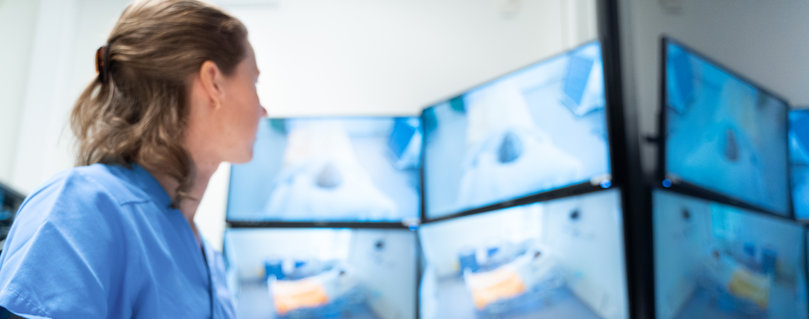Unique clinic for research in health technology

Since its founding four years ago, the BTH Research and Education Clinic has been advancing at breakneck speed. The Health Clinic, as it is also known, has become a hub for education and the development of the healthcare of the future.
The BTH Health and Research Clinic has, despite its young age, already become an important focal point for BTH and the region as a whole. The clinic has grown and already needs to expand.
“Interest has been considerable since we opened the clinic in September 2019, and this unique, modern environment has brought many benefits to students, companies and the healthcare system. We need to grow and the expansion has begun,” says Johan Sanmartin Berglund, professor of applied health technology.
The Health Clinic is made up of three different units, each one contributing in part to the development of health technology. Indeed, the clinic is the only one in northern Europe where a solution can be developed all the way from idea to practical application. At the Health Technology Research Lab, researchers and companies are given the opportunity to test how their ideas might function in the healthcare system, even before the product or service is tested on people. At the Clinical Trials Unit, which is the second part of the Health Clinic, the effect of a product and its impact on the course of a disease can be tested in more direct human contact. The third and final part is the Health Education Lab, where the University’s students are given the chance to train and simulate working methods for the healthcare of the future.
“For BTH, the Health Clinic contributes immensely to the research and educational environment, especially for students on our healthcare programmes, but also for engineering students who, through the clinic, are given the opportunity to think innovatively about healthcare and health, which is an area that might otherwise be neglected,” says Johan Sanmartin Berglund. He continues:
“Students who are given the chance to work in an environment such as this one are more attractive in the labour market and better prepared to start their professional lives in business, or the local or regional public sector.”
Major positive effects have been seen in the region since the opening of the Health Clinic, not least during the pandemic and its aftermath.
“The Clinic has become a home for research projects from all over the region and an environment where academia, industry and the public sector meet naturally. Here, it is possible to place various research projects with special requirements that are otherwise usually only found in hospitals, without the associated pressure on the provision of healthcare. It was especially difficult during the pandemic to find lab environments and equipment without creating further negative impact on healthcare queues,” says Johan Sanmartin Berglund.
In addition to growing and becoming even bigger physically, the focus within the Clinic is also developing, usually in the same direction as the healthcare system.
“What we can see now is that we are moving in the direction of finding ways of working for care outside hospitals, for example in the home. For example, we are building advanced living environments to prepare students to work within them. It could be a home setting with a diabetic child, a cancer patient or a person with dementia. The need for technical solutions and modern working methods for these situations is something we will see more of in the future,” concludes Johan Sanmartin Berglund.
The BTH Research and Education Clinic consists of three units.
• Health Technology Research Lab – where researchers and companies can test how their ideas might work in the healthcare system, even before the product or service is tested on people.
• Clinical Trials Unit – where, for example, the effect and impact of a product on the course of a disease are tested in a more direct human contact.
• Health Education Lab – where the University’s students can practice and simulate working methods for the healthcare of the future.
5 October 2023